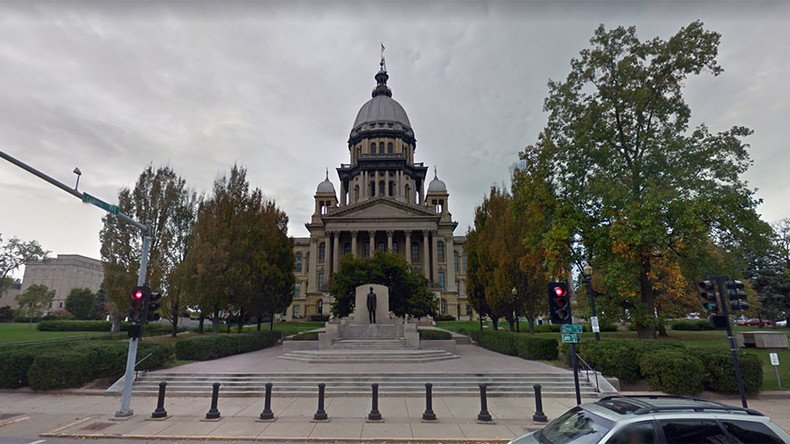Illinois approves first budget in 2yrs as 'junk' credit status looms

Lawmakers approved the first full-year budget in Illinois since 2015, after overriding the governor’s veto of the spending plan. The move, however, might not be enough to save the state from becoming the first in the US with a “junk” credit rating tag.
On Thursday, the Democratic-controlled Illinois House of Representatives, supported by some Republicans, voted 71-42 to override Republican Governor Bruce Rauner’s veto on the $36 billion spending plan. The measure is largely funded by a permanent personal income tax increase of 32 percent, which is expected to generate an estimated $5 billion in revenue.
ILLINOIS HAS PASSED A BUDGET.
— Amanda Vinicky (@AmandaVinicky) July 6, 2017
Illinois House overrides Gov. Rauner veto of SB6, a budget for FY2018. pic.twitter.com/Y8sUuJ9fKV
Rauner pledged to veto the bill over its tax hike and described the budget as “not balanced.” He added that the plan does not “cut enough spending or pay down enough debt, and does not help grow jobs or restore confidence in government,” according to a Facebook post on Thursday.
Illinois currently has $15 billion in unpaid bills and more than a quarter-trillion in unfunded pensions.
Without a budget, the state has been forced to delay or stop payments to many services that benefit the elderly, the poor, and students. Public universities risked losing their accreditation, social service providers could have been forced to close their doors, and government employees could have faced layoffs.
The IL House overrides @GovRauner's veto... barely! 71-42 Illinois now has a budget. Thousands will benefit, especially the most vulnerable.
— Marcos Ceniceros (@marcos_chi_) July 6, 2017
Susana Mendoza, the state’s comptroller, said the budget would give the state funds “to stop the hemorrhaging,” but it would not solve the financial crisis.
“The last two years have taken us almost entirely off the cliff,” Mendoza said, according to the New York Times. “But we’re by no means out of the woods. Our office is still going to be very challenged to pay the bills.”
What would junk status mean for the state of Illinois? #twillpic.twitter.com/KhKqDa69t1
— Illinois Comptroller (@ILComptroller) July 6, 2017
Eleven Republicans joined Democrats and voted to override Rauner’s veto Thursday, giving the Democrats the 71 votes necessary for an override.
State Rep. Steven Andersson (R-65), said his decision to vote in favor of the override rested on “the difference between ‘might’ and ‘will.’”
“If we don’t vote to override the Governor’s veto, the state will fail. If we vote to override, we might still be downgraded, but it is the far better option of the two,” Andersson said according to his website.
The state currently has an outstanding debt of $32 billion, according to Moody’s Investors Service, which downgraded the state’s credit rating to one notch above ‘junk’ on June 1.
On Wednesday, Moody's placed the state under review for another possible downgrade, saying the budget plan “appears to lack broad bipartisan support, which may signal shortcomings in its effectiveness once implemented.”
“So far, the plan appears to lack concrete measures that will materially improve Illinois' long-term capacity to address its unfunded pension liabilities,” the rating agency said. “In addition, the state's baseline tax collections declined in fiscal 2017, suggesting that any tax increase may yield less revenue than anticipated in coming months.”
#BoomBust: A closer look: Illinois’ budget and OPEC’s cuts [VIDEO] https://t.co/m7V5aJI3yY@BiancaFacchinei
— RT America (@RT_America) June 30, 2017
Illinois already has the lowest credit rating of any state, and a downgrading could make things worse by raising borrowing costs and scaring away investors.
Adding to the drama,Thursday’s vote was delayed for an hour when the capitol building was placed under lockdown after a woman reportedly threw white powder at the governor’s office.
Capitol building is on lockdown right now. I hope that everyone inside is ok. Stay safe. pic.twitter.com/iCSamXjQhI
— Illinois Comptroller (@ILComptroller) July 6, 2017
Here’s the lockdown announcement heard on the floor of the Illinois House a few minutes ago. https://t.co/a6k0wqPpxB
— Brian Mackey (@BrianMackey) July 6, 2017
Illinois Capitol police arrest woman following 'hazmat incident' moments before budget vote. pic.twitter.com/h3iIoObxK5
— Josh Caplan (@joshdcaplan) July 6, 2017
Hazmat crews with @SFD_IL go through the Illinois State Capitol after the building went on lockdown pic.twitter.com/5gqpuwm4g0
— Justin L. Fowler (@justinlfowler) July 6, 2017
Hazmat crews are in Governor’s office pic.twitter.com/5zMN0TIgjf
— Justin L. Fowler (@justinlfowler) July 6, 2017
Hazmat crew emerges from the Capitol. pic.twitter.com/jgB5A3C25D
— IOCI Radio (@IOCIRADIO) July 6, 2017
Bags being rinsed off outside Statehouse pic.twitter.com/YCzoqxY516
— Bernie Schoenburg (@bschoenburg) July 6, 2017











